KABUL, Afghanistan — Four Afghan men were sentenced Wednesday to death by hanging over the filmed mob killing in downtown Kabul of a young woman falsely accused of burning the Quran, a case that horrified the country and showed the dangers women face in the conservative society.
But the family of the 27-year-old woman, a religious scholar named Farkhunda, immediately denounced the verdict as unfair as the judge dropped charges against 18 men for a lack of evidence. Judge Safiullah Mojadedi sentenced eight others to 16 years in prison. Nineteen police officers accused in the case will be sentenced Saturday.
One of Farkhunda’s brothers, Mujibullah, told The Associated Press that his family was angered by the court’s leniency toward the majority of the defendants.
“The outcome of the trial is not fair and we do not accept it — you saw just four people sentenced to death but everybody knows that more than 40 people were involved in martyring and burning and beating my sister,” said Mujibullah, who, like many Afghans, including his sister, uses only one name.
“The whole world has seen the crime that was committed against my sister,” he added. “I am not a cleric, but the Quran says that if anyone kills another human being, then they should themselves be put to death.”
On March 19, a mob attacked Farkhunda after an amulet peddler accused her of burning a Quran after she challenged him over selling his wares to women desperate to have children. Chilling mobile phone videos recorded the horror of the last moments of Farkhunda’s life, as she was punched, kicked, beaten with wooden planks, thrown off a roof, run over by a car and ultimately set afire on the banks of the Kabul River.
An outrage followed her death, as protesters marched in Kabul, some wearing masks bearing the image of her bloodied face. Mourners held candlelight vigils in her memory, even in Washington as President Ashraf Ghani visited the U.S.
An Afghan presidential investigation later found that she had not damaged a copy of the Muslim holy book, but nevertheless, some public and religious figures said the attack would have been justified if she had in fact damaged a Quran.



